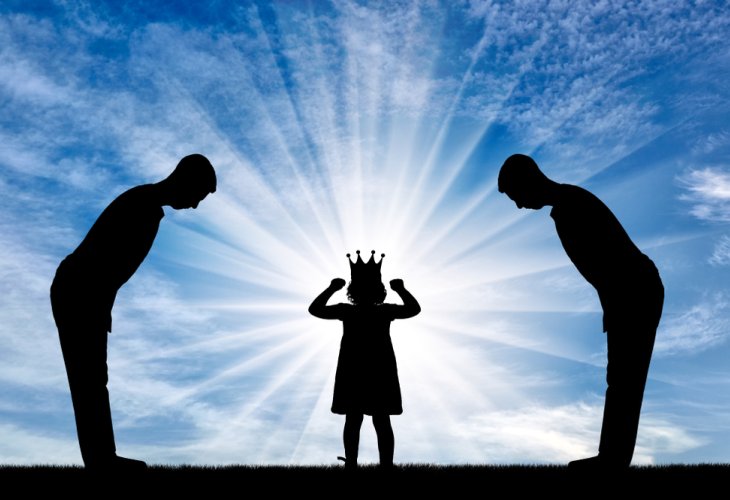Personality Development
The Roles Children Inherit in a Narcissistic Family
Understanding emotional survival mechanisms and the path to healing.
 (Photo: shutterstock)
(Photo: shutterstock)In a previous article, I explained how children's roles are formed within a narcissistic family. Now, we'll continue to explore these different roles. Whether you are a child who finds yourself in one of these roles, or a narcissistic parent, awareness opens the door to emotional growth and personal development.
A child who recognizes themselves in one of these roles may begin to feel a release from guilt, and this understanding can be the first step toward healing and self-care- freeing both themselves and those around them from blame.
Knowledge is power which enables us to set boundaries in situations that otherwise pull us into unnecessary suffering. When you can identify yourself in one of these roles, you can begin the process of change. Understand that by nature, individuals with narcissistic traits are often resistant to change, due to rigid personalities and an inability or unwillingness to engage in self-reflection or gain personal insight.
The goal of this information is to raise red flags and inspire personal growth, not to diagnose others. The descriptions below apply to both men and women.
The Responsible / High-Achieving Child
This is often the eldest child. This role is characterized by a heightened sense of morality or conscience, and a tendency to take on a parental role within the family from an early age, long before they are developmentally ready.
These children tend to be perfectionists, excelling in various areas including academics, religious observance, athletics, etc. Their identity becomes rooted in external achievements and their role serves to mask the dysfunction within the family. The unconscious message they project is: “I’m so successful because I was raised well,” even when the reality is far from it.
This child suppresses emotions to the point of emotional numbness. Deep down, they often feel insecure and unfulfilled so that once they achieve one goal, they immediately pursue another. No achievement feels like enough and something always seems to be missing.
Despite their success, they fear being “found out” as not truly being who they appear to be. They are often overly self-critical and also critical of others, and they struggle to accept criticism themselves.
Unlike the “Golden Child” who is a direct extension of the narcissistic parent, the Responsible Child plays more of a parental role and serves as a buffer for family dysfunction.
The Caregiver / Peacekeeper Child
This child’s role is to emotionally care for the family, especially due to the emotional instability and mood swings of narcissistic parents. These children are typically calm, sensitive, and nurturing by nature.
They are conflict-averse and will do almost anything to prevent emotional chaos or arguments. When they sense a potential outburst in the family, they’ll act quickly to restore peace, even at a personal cost.
Despite deeply needing emotional support themselves, they rarely ask for it. They don’t know how to articulate their emotional needs and tend to prioritize others, often at their own expense.
They often become people-pleasers, always putting others first. Over time, it becomes genuinely difficult for them to receive anything from others- being the recipient makes them uncomfortable, so they instinctively shift back into a giving role.
The Manipulative Child
This child is characterized by less flattering traits. On a subconscious level, they come to believe that in order to survive in life, one must be selfish, cunning, and exploitative. Their motto might be, “What, am I a sucker?”
Using sharp survival instincts, they often manipulate and control family dynamics behind the scenes. They’ve learned from the narcissistic parent to be prideful and entitled. When it comes to their own emotions, they become hardened and sly, acting without consistent values or principles. They know how to work under the radar.
They exploit their family's weaknesses to get what they want, including lying, stirring conflict, and using charm to achieve their aims. They often manipulate influential family members into siding with them or believing their version of events, deflecting blame onto others.
Though they may appear humorous or witty, their sense of humor is often sarcastic, biting, and toxic- not the warm, anxiety-relieving humor you'd expect from a funny person. Their jokes aren't lighthearted but carry a sting beneath the surface.
If this child doesn't receive therapeutic support, these behaviors will likely follow them into adulthood.
The Emotional Toll of Narcissistic Families
While it is typically hidden and hard to detect, children raised in narcissistic households often endure significant emotional abuse. Early intervention during childhood or adolescence is critical, as it can soften these roles and allow these children to lead healthier, more joyful lives.
If you feel that you've been assigned a role that wasn't mentioned here, you're welcome to share your experience in the comments and help expand the conversation.
Dr. Ada Michal Weinstein is a certified psychodrama therapist, specializing in narcissism and working, among other things, with victims of narcissists.

